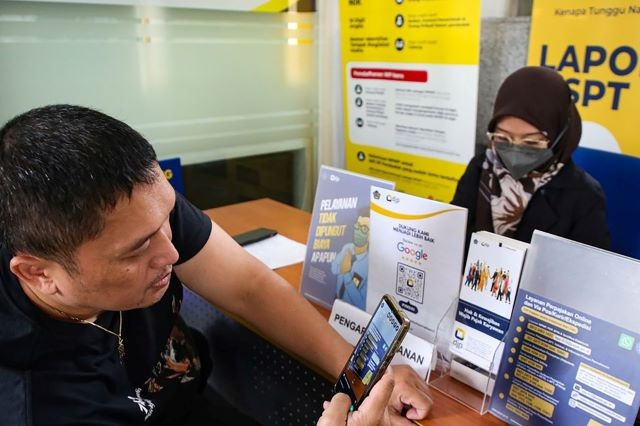Popular Reads
Top Results
Can't find what you're looking for?
View all search resultsPopular Reads
Top Results
Can't find what you're looking for?
View all search resultsRegional economic integration underpins Indonesia’s transformation
Indonesia is situated in the middle of the dynamic Indo-Pacific region, and deepening regional economic integration is a strategic objective because it underpins future stability and prosperity.
Change text size
Gift Premium Articles
to Anyone
I
ndonesia is situated in the middle of the dynamic Indo-Pacific region, and deepening regional economic integration is a strategic objective because it underpins future stability and prosperity. This was a priority for Indonesia while serving as chair of ASEAN this year. It also guided President Joko “Jokowi” Widodo's recent visit to the United States to participate in APEC Leaders' Week.
During the week, the Indonesia-US Comprehensive Strategic Partnership (CSP) was launched, which elevates the relationship between the two major democracies and economies. The partnership sets a pathway for deeper linkages between governments, businesses and people, even amid rising geopolitical uncertainty.
The CSP has a forward-looking economic agenda to advance trade and investment interests through bilateral and multilateral mechanisms. It highlights critical sectors for joint efforts, particularly boosting innovation and technological collaboration in energy, health and agriculture. Swift progress in these critical sectors could support productivity growth and ensure competitive industries in both economies, given their different comparative advantages and shared interests in achieving sustainable economic development.
For Indonesia, the benefits of the new approach include boosting technology-led investment to develop and grow new growth industries and enable more value-added production. The CSP enables Indonesia to access US technical know-how, which is essential for developing local skills and a talent pipeline. This will equip Indonesia to harness new economic opportunities that are vital to escape the middle-income trap.
New priority areas for cooperation, such as critical minerals and semiconductors, highlight the importance of preparing for future growth industries together. The countries agreed to develop a bilateral action plan to boost quality investment in critical raw materials, ensure resilient supply chains and improve sustainability practices in critical minerals extraction and derivative industries. They also aim to lay the foundation for negotiating a sector-specific trade agreement. Furthermore, the countries are cooperating on boosting manufacturing and development of semiconductors, which are key components from electronics to electric vehicles throughout the region and global value chains.
Diversifying trade and investment is mutually beneficial for the US and Indonesia. It helps to ensure the resilience of value chains and the stability of the global economy, which could well have been a driving force for the Biden administration's decision to endorse Indonesia's request to open accession discussions with the OECD. During their meeting at the White House, President Jokowi and President Biden also discussed the upcoming national elections and the vital importance of providing opportunities to people and communities in both countries. To achieve this, sustainable and inclusive economic growth and quality employment are shared objectives.
Discussions on the Indo-Pacific Economic Framework, a US regional initiative, were also held on the sidelines of APEC Leaders’ Week. Partners welcomed considerable progress on the new and comprehensive approach to regional economic engagement, which has been made quickly as the initiative was only launched in May 2022.
IPEF partners share the objective of growing cross-border trade and investment by realizing high standards and cooperation for mutual benefit. The group is ready to implement the signed IPEF Supply Chains Agreement, and substantially concluded negotiations for the IPEF Clean Economy Agreement, the IPEF Fair Economy Agreements and the Framework Agreement establishing the IPEF Council to oversee the long-term development of the economic community. This is a testament to the commitment of all IPEF partners to realizing free and fair trade and investment, underpinned by a robust multilateral trading system and rules-based global order to support business certainty.
IPEF partners continue building on this momentum to advance trade cooperation. To be clear, IPEF partners are not discussing a free trade agreement to provide market access or reduce tariffs, other mechanisms do this. In San Francisco last week, partners, including the US and Indonesia, welcomed swift progress on negotiating the innovative draft of the IPEF Trade Agreement, having already settled on the scope and core chapters on good regulatory practices, domestic services regulation, customs and trade facilitation, as well as sustainable agriculture, inclusivity, technical assistance and economic cooperation. The goal is to eliminate difficult, behind-the-border barriers preventing connectivity and seamless commerce across the region. Low tariffs are no longer the top concern to facilitate trade, yet agreed-upon equal standards determine seamless trade and investment flows to a greater degree. This is what partners are working on in the IPEF.
Ensuring that the benefits of trade and investment are widely shared is fundamental to the framework. Under the new approach, steps are being taken to strengthen domestic policy settings, safeguards and social safety nets so that tangible benefits can be shared among the diverse group of partners, for instance, sharing best practices on public consultation and stakeholder engagement, advancing employment and skills initiatives and supporting SMEs. Through these measures, IPEF partners seek to empower individuals and communities to achieve a just and inclusive transition, where no one is left behind.
Deepening regional economic integration is a decades-long project. Indonesia is actively shaping international economic architecture to support its transformation into an advanced economy. Moreover, in an era of cooperation and competition, Indonesia is protecting its national interests by pursuing diversification among its priority economic sectors and partners to ensure it remains free and active in years to come.
In short, Indonesia’s economy is open, and it is time to turn into a producer country instead of relying only on consumption. Meanwhile, its foreign policy guideline is “free and active”. This means that if its economy is open, it must be active and free to partner with any countries.
This article was published in collaboration with Coordinating Ministry for Economic Affairs Republic of Indonesia











